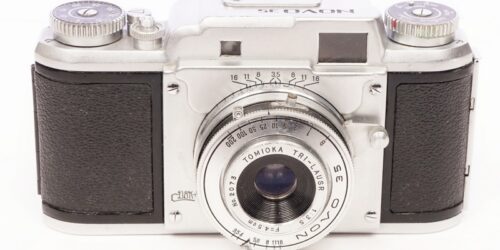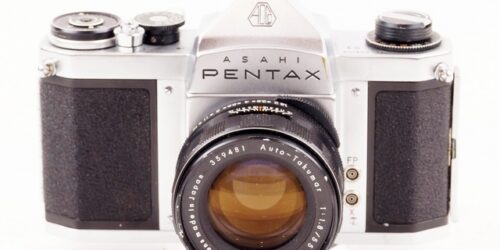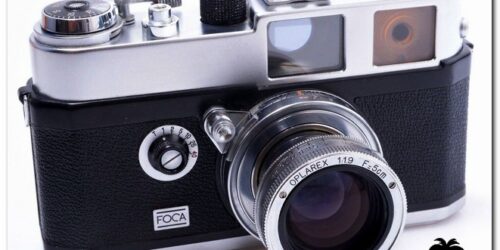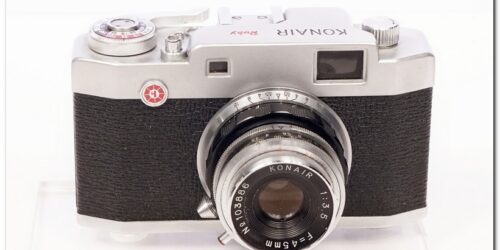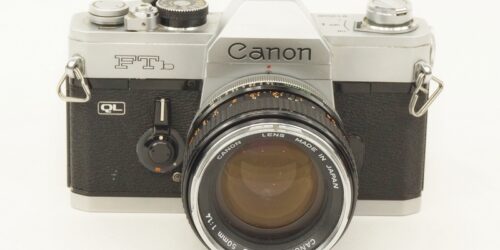Walz / Lafayette Electrick
Walz / Lafayette Electrick
Walz Electrick current value
Lafayette Electrick current value
Walz / Lafayette Electrick user manual
The Walz camera brand shows little in an online search. It is mentioned on the fly as both a manufacturer and distributor, with no hard evidence to support either fact. With Japanese camera brands, it is either that there is no information online or in print, or a search returns dozens of articles. I am inclined to believe that Walz was a distributor, as the company is known for selling photography accessories and trinkets, such as filters, light meters, hoods, lens covers, timers, and similar items. A manufacturer would have concentrated on the main line, cameras, rather than spreading itself too thinly on accessories.
The Walz line camera shows a few early folders as of 1952, followed by TLR and rangefinders until 1960. A total of 26 models, all of which look like chips of the same flock. Most carry the Walz brand, with the Walz Envoy being the most well-known, while others, such as the Lafayette Electrick, differ. The Lafayette was made for Lafayette Radio, a long-defunct electronics distributor in New York.
The Electrick is an epitome of a 1960s rangefinder. It is about the size of the Yashica Electro line, but heavier. Much heavier. It weighs approximately 200 grams (about 7 oz.) more than the average of this class. Introduced in 1960, together with its’ twin and the Automat 44 TLR, it was the last of the Walz line.
It was offered with two lenses: a 1.8/45 and a 2.8/45, which is the model I have.
The camera falls nicely in the hand, should you ignore the unexpected weight. The viewer is positioned on the left, making it easy for shooters like me, who use their right eye. It is a minor issue, but it can be annoying if the window is positioned in the middle or at the right. An easy-to-reach winding lever, complemented with a self-setting exposure counter, clicks to zero upon closing the back.
A wide and bright viewer with a parallax frame, together with an easy-to-read meter display within the viewer. A second meter display is on the middle top cover. The prominent selenium light meter lens is nicely positioned at the front, in line with the finder windows, giving it a well-balanced look. All it takes is to set the shutter speed and thereafter set the aperture so that the meter needle, at the internal or external display, aligns with the red mark. But not so fast.
top cover. The prominent selenium light meter lens is nicely positioned at the front, in line with the finder windows, giving it a well-balanced look. All it takes is to set the shutter speed and thereafter set the aperture so that the meter needle, at the internal or external display, aligns with the red mark. But not so fast.
The said setting dials are mounted towards the end of the lens assembly. Designers had in mind thin and gentle fingers. I found it difficult to move one ring without the other following suit. Guess it takes getting used to it.
The distance dial is by the body, operated by the left hand. The travel is on the scant side; a bit longer travel could make focusing easier. Markings are both in feet and meters, with the depth of field marked by it. The self-timer lever hides underneath the lens barrel.
The rewind release and crank are located at the bottom, where the crank folds into the bottom plate, keeping the top uncluttered. The back opens via a latch on the side, revealing a typical film track with a permanent take-off spool.
Regarding weight, it appears that the makers designed this camera to be impact-resistant. Otherwise, I see no reason for the weight. The back cover is made of steel while the rest is probably aluminum alloy, but a lot of it.
| List number | 15310 |
| Brand | Walz |
| Format | 35mm |
| Model | Lafayette Electrick |
| Introduced | 1960 |
| AKA | Walz Electrick |
| Country | Japan |
| Type | Rangefinder |
| Body material | Metal |
| Mode | Shutter priority, manual |
| Weight | 810 gr, Body with lens |
| Class average weight | 670 gr, Body with lens |
| ASA range | 10-800 |
| Kit lens | 1.28/45 |
| Lens make | Lafayette / Cominar |
| Filter size | 49mm |
| Lens mount | Fixed lens |
| Mount size | NA |
| Aperture | 2.8-22 |
| shutter | Leaf |
| Light meter | Selenium, coupled |
| Winder | Lever |
| Lock | No |
| Speeds | B-500 |
| DOF preview | No |
| Exposure lock | No |
| Exposure compensation | No |
| Shoe | Cold |
| External sync | X/M |
| Sync speed | 60 |
| Timer | Mechanical |
| Battery | N/A |
| Battery style | |
| Battery voltage | N/A |
| Integral flash | None |
| Other |









